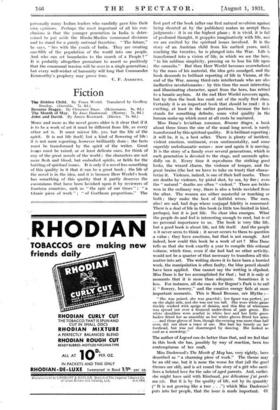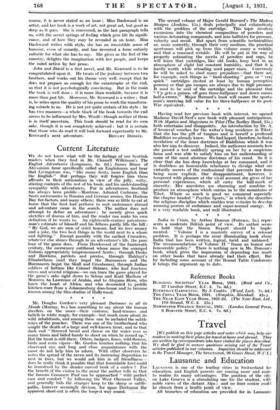Fiction
Tim -Hidden Child. By Franz Werfel. Translated by Geoffrey -Dunlop. (Jarrolds. 78. 6d.) MORE and more as the novel grows older is it clear that if it is to be a work of art it must be different from life, as every other art is. It must mirror life, yes, but the life of the spirit. It is not life itself, but a kind of flowering of life : it is not mere reporting, however brilliantly done ; the facts must be transformed by the spirit of the writer. Great issues must be raised, or at least delicate ones, for think of any of the great novels of the world ; the characters are not mere flesh and blood, but embodied spirits, or fields for the battling of spiritual issues. It is only if a novel has something of this quality in it that it can be a great book ; the life of the novel is in the idea, and it is because Herr Werfel's book has something of this quality that it partly deserves the encomiums that have been lavished upon it by reviewers of fourteen countries, such as " the epic of our times " ; " a titanic piece of work " ; " of Goethean proportions." The first part of the book (after our first natural revulsion against being shouted at by the publisher) makes us accept these judgments : it is on the highest plane ; it is vivid, it is full of profound thought, it grapples imaginatively with life, and we are excited by the spiritual issues involved. It is the story of an Austrian child from his earliest years, until, reaching the twenties, he is plunged into the War. Life is transformed into a vision of life, in which we see the hero, " in his sublime simplicity, pressing on to lose his- life Upon the summits." But then Herr Werfel becomes overwhelmed by the mass of his material, the idea gets smudged, and the book descends to brilliant reporting of life in Vienna, at the end of the War, among third-rate intellectuals who are also ineffective revolutionaries : by this time the most interesting and illuminating character, apart from the hero, has retired to a lunatic asylum. At the end Herr Werfel recovers again, but by then the book has sunk out of the really first class. Certainly it is an important book that should be_rea:c1 : it is exciting, at least in the earlier portions, because the hero stands for something definite, some vital quality in the human make-up which must at all costs be nurtured., Miss Dane's leviathan romance, Broome Stages, a book about three times the size of the usual long novel, is rarely transformed by this spiritual quality. It is brilliant reporting ; it will be, it is, a best seller. There is plenty of incident, violent emotion, sentiment, even sentimentality, and some superbly melodramatic scenes : now and again it is moving. It is the story of a family over several generations, which in each generation is devoted to the stage, and succeeds splen- didly on it. Every time it reproduces the striking good looks, the wizard charm, the violence of temper, and the great brains (the last we have to take on trust) that charac- terize it. Violence, indeed, is one of their hall marks. There are deaths by violence, by pistol shot, by sea, by fire ; even the " natural " deaths are often " violent." There are brides won in the ordinary way, there is also a bride ravished from the altar. The women are either masterful or touching or both ; they make the best of faithful wives. The men, alas! are sad, bad dogs where conjugal fidelity is concerned- There is a deal of life in this book (a little too limited in kind, perhaps), but it is just life. No clear idea emerges. 'What the people do and feel is interesting enough to read, but is of no personal importance to us. The book is very like life, but a good book is about life, not life itself. And the people n it never seem to think ; it never occurs to them to question a value ; they have emotions, but that is not enough; And indeed, how could this book be a work of art ? Miss Dane tells us that she took exactly a year to compile this colossal volume, which time, even if she had had no other activity, would not be a quarter of that necessary to transform all this matter into,art. The writing shows it, to have been a hurried work, the manipulation is often faulty, the blue pencil should have been applied. One cannot say the' writing is slipshod, Miss Dane is far too accomplished for that ; but it is only at moments that it is more than adequate. Sometimes it is less. For instance, all she can do for Regent's Park is to call it " flowery, bowery," and the creative energy fails at more important moments. This is Maud Broome, née Blythe " She was poised, she was graceful ; her figure was perfect, yet on the slight side, and she was not too tall. She wore white gauze thickly worked with sprigs of daisies, and this film of whiteness was spread out over a flounced under-dress of pale green. Her white shoulders were scarfed in white lace and her little green bodice fitted her as smoothly as her white gloves fitted her arms . . . and those gloves of hers, though the evening was more than half over, did not show a trace of use. Her hair lay loosely on her forehead, but was not disarranged by dancing. She looked as cool as a snowdrop."
The author of Legend can do better, than that, and we feel that in this book she has, possibly by way of reaction, been too contemptuous of her craft.
Miss Dashwood's The Month of May has, very rightly, been described as " a charming piece of work." The theme may be an old one, but it is none the worse for that (all the good themes are old), and is set round the story of a girl who sacri- fices a belated love for the sake of aged parents. And, earlier, she might have said with Rimbaud, par delieatesse j'ai perdu ma vie. But it is by the quality of life, not by its quantity (" It is not growing like a tree . . .") which Miss Dashwood puts into her people, that the issue is made important. Of
course, it is never stated as an issue ; Dashwood is an
artist, and her book is a work of art, not great art, but good as deep as it goes. - She is concerned, as the last paragraph tells us, with the secret springs of feeling which give life its signifi- cance, and of how they may be revealed in an hour. Miss Dashwood writes with style, she has an irresistible sense of humour, even of comedy, and has invented a form entirely suitable for what she hasto say. She gives us the feel of the country, delights the imagination with her people, and keeps the mind active by her prose.
John and David is a first novel, and Mr. Kenward is to be congratulated upon it. He treats of the jealousy between two brothers, and -works out his theme very well, except that he does not prepare us enough for the catastrophe at the end, so that it is not psychologically convincing. But in the main the book is well done ; it is more than readable, because it is more than just life. Moreover, Mr. Kenward is a writer ; that is, he relies upon the quality of his prose to work the transform- ing miracle in us. He is not yet quite certain of his style : he has two manners—a whole block of the book towards the end seems to be influenced by Mrs. Woolf—though neither of them is in itself uncertain. This book should be read for its own sake, though it is not completely achieved : but it is certain that those who do read it will look forward expectantly to Mr.



































 Previous page
Previous page